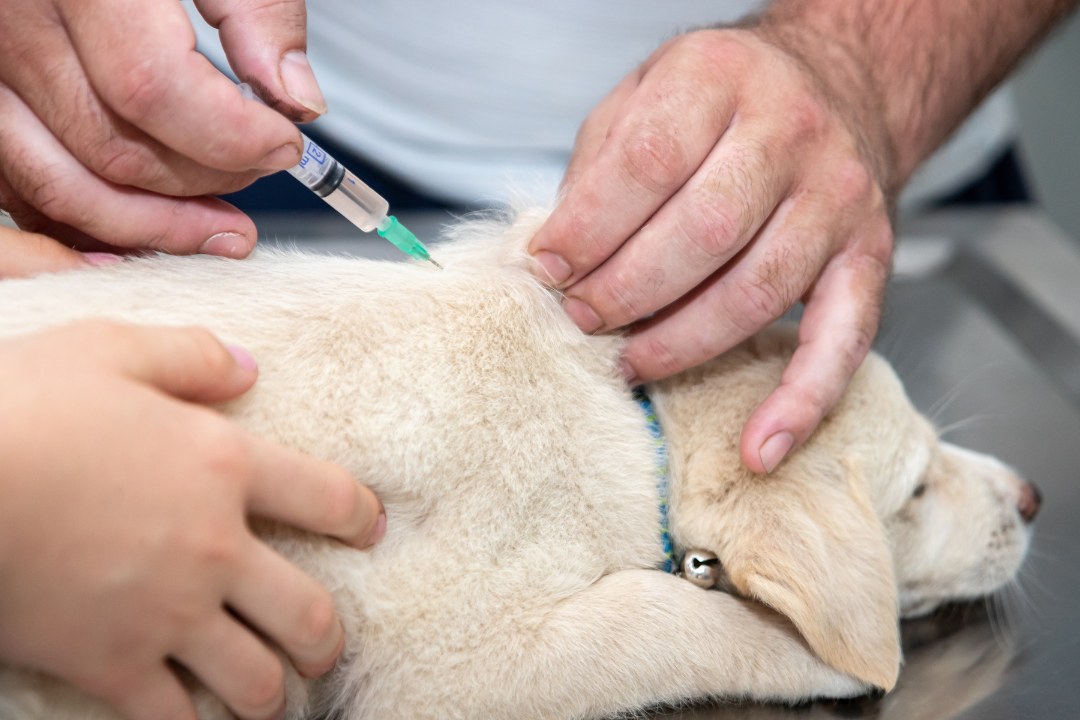New cat
How to set up your home to help your new cat settle in quickly
Cats, Adopters, Cat behaviour, Kitten

Here is information about dog vaccinations so you can feel more confident in discussions with your vet about your pet’s health.
This set of core vaccinations protect pets when at their most vulnerable and provide a blanket of protection for those who are not vaccinated, as it lowers the chances of the disease being present in the environment.
These are in two doses, with the second given 4 weeks after the first (although your vet will confirm this when you book).
Here’s what your puppy will get vaccines against, with the first dose at aged from 8 weeks:
• Canine parvovirus, CPV
• Canine distemper virus, CDV
• Canine adenovirus, also known as infectious canine hepatitis, CAV-1 CAV-2
• Leptospirosis
There is also an annual vaccine to help protect against kennel cough (to protect, rather than prevent, as it is a complicated infection), and is the only vaccine which isn’t by injection, but instead a liquid squirted up the nose, so it gets where it is needed. This is given every year.
You may also get a vaccine for rabies, if you are planning to take your pet to the EU.
Let’s take a closer look at what we are protecting from.
We see these at the rehoming centre on a regular basis from unvaccinated animals, especially those who have been living in dirty or overcrowded conditions.
Canine parvovirus
The virus stops the body absorbing nutrients from food, and brings severe and bloody diarrhoea, vomiting and dehydration. Animals weaken and usually die. It is highly contagious from the infected dog’s poop and wee and can survive on grass, shoes, unwashed bedding etc. for several months. A puppy can die within 3 days from initial infection, with a death rate of 90% although survival is possible if treated early enough.
Kennel cough
Causes a hacking cough and other breathing problems which is normally easy to recover from but must not be underestimated in vulnerable pets. It spreads quickly through the phlegm and can linger in the environment for up to 6 weeks. It is particularly recommended for those living with other dogs or in regular close contact with other dogs (for example, in doggy day care groups).
These diseases are still around in the world and are now only rare in the UK because of good hygiene in our environment, plus we have spent decades eradicating them through vaccinations and quarantine, and we want to keep it that way!
Canine distemper
Affecting the nervous system, this causes fever, digestion and breathing issues. Around 80% of puppies infected will die.
Canine hepatitis / adenovirus.
The virus attacks liver, lungs, kidneys, spleen and blood vessels, causing jaundice, fever and digestion problems. Half of infected dogs will die.
Canine leptospirosis
Causing severe kidney and liver problems, some strains can infect people and are potentially fatal.
Rabies
An infection in the brain which kills all infected animals and people.
Every year, we take our pets into the vets for ‘boosters’ to ensure immunity.
Some vaccines have a longer lifespan than others, so although booster jabs will be one injection it will be a different mix depending on what is needed. For example, leptospirosis will be given every year, and the others every 3 years.
You can ask for a blood test to check your pet’s immunity levels; however, this is not possible for leptospirosis or kennel cough.
IMPORTANT Many boarding kennels and insurance policies will expect your dog to be up to date with vaccinations and boosters.
Veterinary recommendations change all the time to keep up with the best welfare practices, so now you know more about the diseases and vaccines, please speak with your vet to assess the risk to your pet with their lifestyle and what is best for them.